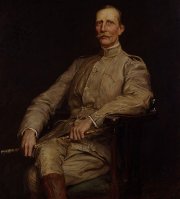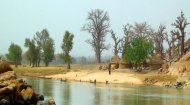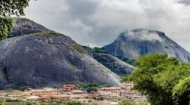|
|
In 1886 the company was once again renamed as the Royal Niger Company after receiving a charter from the British government authorizing it to administer the Niger Delta and the country on the banks of the Niger and Benue rivers. However this mandate by itself was insufficient to stop the growing role in the area of the state sponsored protectorates of France and Germany who were also jostling for hegemony as well as growing dissent from native tribes of the interior that often broke out into open conflict requiring use of gun boats deployed by the Royal Navy. As such, on 31st December 1899, the Royal Niger Company sold its interests to the British Government for £865,000 and merged with the Niger Coast Protectorate (formerly the Oil Rivers Protectorate of Brass, Bonny, Opobo, Aobh, and Old Calabar excluding Lagos) to form the Southern Nigeria Protectorate under the control of the British Colonial Office. The pursuit of this oil wealth, however, came at an exorbitant cost, primarily manifesting in severe environmental impact. Perhaps the most visible and devastating aspect is the incessant occurrence of oil spills. Estimates suggest that thousands of oil spills have occurred in the Niger Delta over the past five decades, releasing millions of barrels of crude oil into the environment. These spills stem from a myriad of causes: ageing and corroded infrastructure, equipment failure, operational negligence by oil companies, and deliberate sabotage and crude oil theft. Regardless of the cause, the consequences are catastrophic. Oil contaminates farmlands, rendering them infertile and destroying crops. It pollutes rivers and creeks, poisoning fish stocks, contaminating drinking water sources, and decimating mangrove forests, which are vital breeding grounds for marine life and natural barriers against coastal erosion. The persistent sheen of oil on waterways, the blackened soil, and the stench of hydrocarbons are ubiquitous features across vast swathes of the delta. |
Niger Delta |
Niger Delta |
Niger Delta |
Niger Delta |

|
Beyond spills, gas flaring represents another major environmental scourge. Nigeria is one of the world's largest gas flarers, burning off associated natural gas that comes to the surface with crude oil, primarily due to a lack of infrastructure for its capture and utilisation. This practice releases enormous quantities of greenhouse gases, including carbon dioxide and methane, contributing significantly to climate change. Locally, gas flaring results in acid rain, which damages crops and corrodes buildings, and releases toxic pollutants such as black carbon, volatile organic compounds, and heavy metals. These airborne toxins pose severe health risks to nearby communities and contribute to respiratory illnesses, skin conditions, and various cancers. Furthermore, dredging for oil exploration and transport, along with the construction of access roads and facilities, has led to extensive habitat destruction, altering natural hydrological patterns and accelerating erosion. The profound impact on lives around the delta are a direct consequence of this environmental degradation and the socio-economic disparities inherent in the region. For communities whose livelihoods are inextricably linked to fishing and agriculture, oil pollution has been nothing short of a death knell. Contaminated waters mean fewer fish, leading to chronic food insecurity and the collapse of traditional economies. Barren farmlands due to oil-saturated soil force once self-sufficient farmers into destitution. This economic disenfranchisement pushes many young people into illegal activities like bunkering (oil theft) or militancy, exacerbating a cycle of violence and instability. The health implications are equally dire. Residents of the Niger Delta, particularly those living close to oil exploration sites, suffer from disproportionately high rates of illnesses. Contaminated drinking water causes waterborne diseases, while exposure to air pollutants from gas flaring and spills leads to increased incidences of respiratory problems, birth defects, skin lesions, and various forms of cancer. Without adequate healthcare facilities, these health crises remain largely unaddressed, adding to the pervasive sense of neglect and injustice. Compounding these issues is the pervasive sense of marginalisation and neglect felt by delta communities. Despite living atop vast oil wealth, many lack basic amenities such as clean water, electricity, schools, and healthcare. The wealth generated from their land flows primarily to the federal government and oil corporations, with little tangible development reaching the grassroots. This disparity fuels resentment, leading to various forms of social unrest, including protests, kidnapping of oil workers, and organised militancy, further destabilising the region and hindering any genuine efforts towards sustainable development. Looking towards the future, the Niger Delta faces a complex array of challenges and opportunities. The effects of climate change, including rising sea levels and increased frequency of extreme weather events, threaten to exacerbate existing vulnerabilities, particularly coastal erosion and flooding. The global push for renewable energy also signals a gradual but inevitable decline in the demand for fossil fuels, necessitating a radical diversification of Nigeria's economy and, by extension, the Niger Delta's. For a sustainable future, it is believed several critical pathways must be pursued. Firstly, comprehensive environmental remediation is imperative. Large-scale clean-up operations, such as the ongoing Ogoni cleanup, must be accelerated and replicated across the delta, with strict accountability for the polluters. This must be coupled with rigorous environmental regulations, their enforcement, and the modernisation of oil infrastructure to prevent future spills and end gas flaring. Secondly, economic diversification and sustainable development are crucial. Investing in alternative livelihoods such as sustainable aquaculture, eco-tourism, improved agriculture, and small-scale industries can reduce reliance on the oil sector and empower local communities. This requires significant investment in education, vocational training, and infrastructure development. Thirdly, good governance and resource justice are paramount. There needs to be greater transparency and accountability in the management of oil revenues, ensuring that a fair share directly benefits the communities that bear the environmental burden. Empowering local communities with a greater say in decision-making processes regarding resource extraction and development projects is essential for fostering trust and ownership. Equally importantly, is addressing the root causes of conflict and insecurity by fostering dialogue, reconciliation, and providing opportunities for disillusioned youth is critical for long-term peace and stability. The Niger Delta's future hinges on a concerted, multi-pronged approach involving the Nigerian government, oil companies, local communities, and international partners. The video of the Niger Delta has some different facts and figures however describes what may happen to the area and its inhabitants should climate change continue to flood the area. After you've watch the video explore the Niger Delta using our interactive map above. |
 Its fertile lands, enriched by the alluvial deposits of the Niger River, have historically supported robust agricultural practices. Culturally, the region is a mosaic of ethnic groups, each with unique traditions and a deep connection to their environment, which has shaped their livelihoods and identities. Originally covering areas that were part of the ancient Benin and Calabar kingdoms the land determined as the Delta today occupies 70,000 square km and is home to thirty one million, mainly impoverished people.
Its fertile lands, enriched by the alluvial deposits of the Niger River, have historically supported robust agricultural practices. Culturally, the region is a mosaic of ethnic groups, each with unique traditions and a deep connection to their environment, which has shaped their livelihoods and identities. Originally covering areas that were part of the ancient Benin and Calabar kingdoms the land determined as the Delta today occupies 70,000 square km and is home to thirty one million, mainly impoverished people. As Nigeria began to prepare for independence, the search for oil began in the Delta in the 1950s and by 1956 it was discovered in commercial quantities at Oloibiri. Less than two years later it was being commercially produced and sold on the international markets and what began as a promise of prosperity quickly transformed into a source of immense wealth for the Nigerian nation, establishing oil as the backbone of its economy. Today, Nigeria is Africa's largest oil producer, with the vast majority of this output originating from the Niger Delta's onshore and offshore fields. The presence of multinational oil corporations (MNCs) and state-owned enterprises has led to the development of extensive infrastructure, including oil wells, pipelines, flow stations, and export terminals, transforming the landscape and the socio-economic fabric of the region.
As Nigeria began to prepare for independence, the search for oil began in the Delta in the 1950s and by 1956 it was discovered in commercial quantities at Oloibiri. Less than two years later it was being commercially produced and sold on the international markets and what began as a promise of prosperity quickly transformed into a source of immense wealth for the Nigerian nation, establishing oil as the backbone of its economy. Today, Nigeria is Africa's largest oil producer, with the vast majority of this output originating from the Niger Delta's onshore and offshore fields. The presence of multinational oil corporations (MNCs) and state-owned enterprises has led to the development of extensive infrastructure, including oil wells, pipelines, flow stations, and export terminals, transforming the landscape and the socio-economic fabric of the region.







